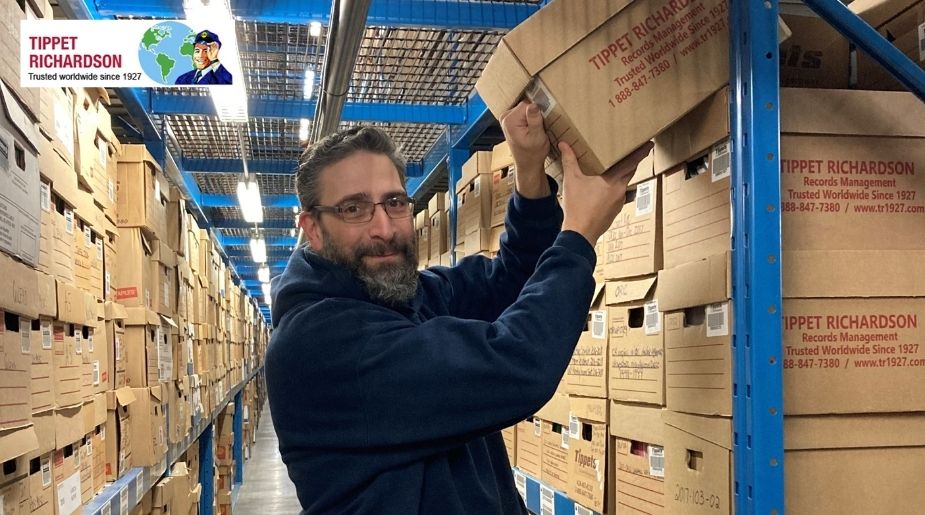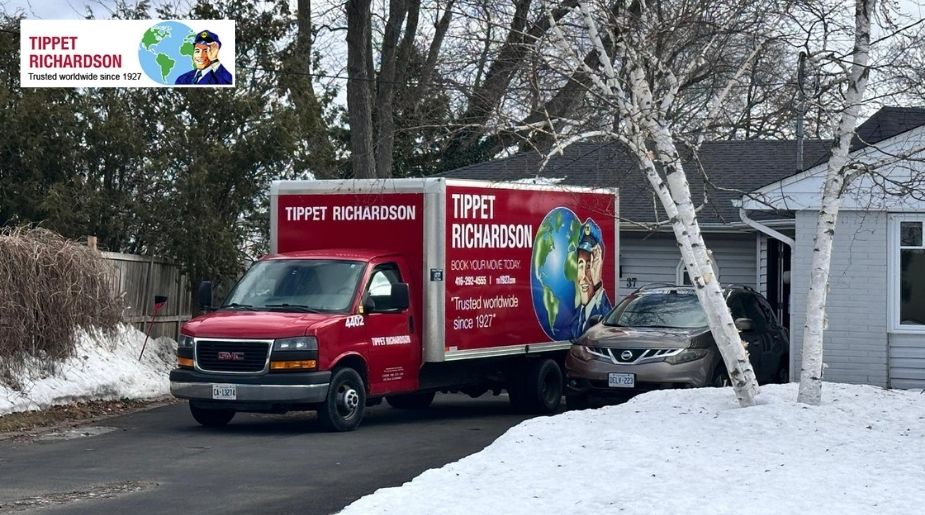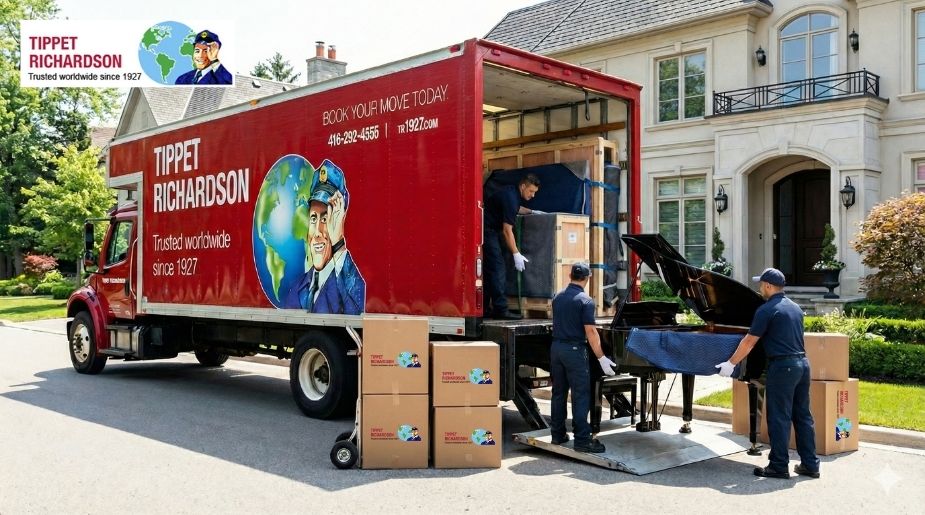Planning a move to Germany from Toronto can feel overwhelming at first. Between the administrative paperwork, packing logistics, and emotional weight of relocating across continents, it’s a journey that requires careful coordination and professional guidance. Whether you’re a professional seeking new opportunities, a student pursuing academics, or a family looking for a lifestyle change, making this transition smooth and stress-free starts with choosing the right moving partner.
Germany remains a popular destination for Canadians looking to build a new life in Europe. Its strong economy, high quality of life, and central location make it ideal for long-term settlement. But the process to relocate to Germany involves far more than just shipping your belongings—it requires thorough planning, deep understanding of international moving protocols, and a seamless support system.
This is where Tippet Richardson, based in Toronto, stands out. With nearly a century of experience in international moving services, the team provides comprehensive solutions tailored to each client’s needs. From pre-move planning to delivery and post-arrival support, their high-end moving solutions are built to make moving to Germany a seamless experience.
Planning Your Move to Germany: Where to Start
The decision to move to Germany is only the beginning. To ensure a successful relocation, it’s essential to have a well-structured plan that addresses all key components of the process.
Understanding the German Relocation Landscape
Germany operates under strict import regulations and administrative systems. Before you move to Germany, understanding what’s allowed and what isn’t can help you avoid unnecessary delays. From knowing what household items are eligible for duty-free entry to understanding how to register your address once you arrive, the administrative steps must be mapped out in advance.
Additionally, Germany’s housing market, local registration requirements (Anmeldung), and residency permits vary by region. Knowing what to expect helps reduce stress and sets clear expectations. While moving to Germany from Toronto, it’s critical to start planning these aspects early—ideally three to six months before your move date.
Creating a Strategic Moving Timeline
A successful international relocation is built on a strong timeline. From sorting out legal documents to booking freight and coordinating arrival dates, each step needs to be aligned. To successfully move to Germany, you’ll need to budget enough time for visa approvals, employer documentation (if applicable), and international shipping coordination.
Working with Tippet Richardson gives you access to professional move coordinators who help map out this timeline in detail. Based in Toronto, their consultants guide you through every step of the journey, ensuring nothing is left to chance.
Preparing Emotionally and Logistically
Beyond paperwork and packing lists, preparing for a move to Germany also requires emotional readiness. A Canadian moving to Germany will experience cultural differences, new languages, and unfamiliar bureaucracies. Having professional support during this process ensures you’re never alone. The logistics are challenging, but so are the personal transitions—both deserve attention and preparation.
Why Choose High-End Movers to Move to Germany from Toronto
International relocation isn’t the time to cut corners. A move to Germany from Toronto involves thousands of kilometres, multiple checkpoints, and highly specific packing and documentation standards. Partnering with high-end movers ensures a seamless experience that protects both your time and your belongings.
Expertise in International Logistics
International moving comes with complex challenges—ocean freight coordination, customs declarations, and transit insurance considerations, to name a few. A high-end mover like Tippet Richardson brings deep expertise in navigating these logistics with precision. Their international experience ensures that your move to Germany complies with local regulations in both Canada and Germany.
Movers unfamiliar with international requirements often make costly mistakes—delayed shipments, customs holds, or incorrect packaging. Tippet Richardson’s seasoned professionals anticipate these issues and proactively manage them to keep your relocation on track.
Minimizing Risk Through Professional Coordination
Unlike domestic relocations, an international move requires layered coordination between multiple vendors, freight partners, and regulatory bodies. High-end movers assign a dedicated move coordinator who acts as your single point of contact throughout the entire process. For those planning a move to Germany from Toronto, this ensures consistent communication from pre-move to final delivery.
This approach reduces miscommunication and mitigates risks. Your coordinator tracks your shipment in real time, ensures that paperwork is correctly filed, and handles the nuances that come with international customs procedures. For anyone wondering how to relocate to Germany with confidence, this level of coordination is a must.
Tailored Service for Canadian Clients
Every relocation is unique, and so are the needs of each client. A Canadian planning to move to Germany may have different priorities than someone moving from another part of the world—such as aligning arrival times with academic calendars or securing temporary housing in advance.
Tippet Richardson’s consultative approach means services are designed around your specific needs. From white-glove packing services in Toronto to unpacking support in Germany, every detail is handled with precision. This premium level of service ensures that your move to Germany doesn’t just go smoothly—it feels effortless.
Pre-Move Checklist for Canadians Moving to Germany
Before your international shipment leaves Toronto, there are several essential steps to complete. To successfully move to Germany, being organised and detail-oriented from the beginning is key. Creating a comprehensive checklist helps manage your timeline and reduces the stress that often comes with relocation.
Document Essentials for International Relocation
To move to Germany, you’ll need to prepare a range of personal documents. At the top of the list are your passport, visa (or residence permit), employment contracts, and, if applicable, enrolment confirmations from educational institutions.
These documents should be gathered well in advance, and multiple copies—both digital and physical—are recommended. It’s important to also verify if any documents require authentication, such as notarised translations or apostilles. When moving to Germany, administrative requirements can vary slightly depending on your destination city or state.
Tippet Richardson’s experienced team in Toronto can help guide you through the documentation process by connecting you with international relocation resources that align with German requirements.
Managing Your Inventory Before the Move
An international move to Germany isn’t the time to ship everything you own. Canadians often find that downsizing not only saves on shipping costs but also simplifies the settling-in process. Begin by categorising items into essentials, donate/sell, and store.
With Tippet Richardson’s support, you can make informed decisions about what to ship and what to store safely in their Toronto-based pallet storage facilities. Their experts help you build a detailed inventory, a vital step for customs declarations and insurance coverage.
Being thorough during this stage is crucial. A complete and accurate inventory ensures a smoother customs process and makes unpacking in Germany far more efficient.
Preparing Items for Overseas Transit
Packing for an international relocation requires a completely different approach than a local move. Fragile items, electronics, and valuables must be packed according to international freight standards. Incorrect packaging can lead to damage during the long journey.
Tippet Richardson uses professional-grade materials and industry-proven techniques to ensure your items are secure. Their team in Toronto applies special attention to items sensitive to temperature, vibration, and stacking. For those preparing to move to Germany, these details make a significant difference.
By trusting a premium moving company, you ensure that everything from family heirlooms to professional equipment arrives safely, allowing you to start your new chapter in Germany with peace of mind.
What to Expect During the International Moving Process
A move to Germany is not a single event—it’s a multi-stage process that spans weeks or even months. Understanding how each step unfolds can help set realistic expectations and give you a clear sense of control. Partnering with a professional mover ensures each stage is planned and executed with precision.
Packing and Handling Standards for Overseas Shipments
International shipments go through a series of transitions, from local loading in Toronto to overseas freight and final delivery when you move to Germany. Because of this, packing must meet high standards. Each item is assessed based on fragility, weight, and shape to determine the best protective method.
High-end movers like Tippet Richardson use customised packing strategies, including wooden crating for valuable or odd-shaped items and shrink-wrapping for additional surface protection. Packing is not just about fitting items into boxes—it’s about protecting your assets across thousands of kilometres.
For anyone considering how to relocate to Germany securely, understanding and investing in proper packing is critical.
Understanding Carrier Liability and Transit Protection
Unlike typical insurance, a move to Germany is covered under carrier liability and additional transit protection options. While damage during shipping is rare with premium movers, it’s important to have financial safeguards in place for peace of mind.
Tippet Richardson offers guidance on selecting the right level of coverage for your shipment. Their consultants explain your options clearly, helping you make informed decisions based on the value and type of goods being shipped. This level of support is particularly valuable for a Canadian moving to Germany, where international coverage requirements may differ from local norms.
Understanding this coverage helps reduce uncertainty and provides confidence as your belongings cross borders.
Working With a Move Coordinator From Start to Finish
One of the most valuable aspects of working with a high-end mover is the dedicated move coordinator assigned to your file. This person becomes your single point of contact from your home in Toronto to your new address in Germany.
The coordinator tracks every phase of your move to Germany, keeps you informed of progress, and solves problems in real time. They handle document submissions, timeline adjustments, and liaise with freight and customs partners on your behalf.
For those unfamiliar with international relocations, this hands-on support eliminates confusion and prevents common mistakes. A coordinator ensures your entire move feels guided and predictable—even when unexpected events arise.
Read also: Top 10 Tips for Hiring a Local Moving Company in Toronto
Customs, Compliance, and Paperwork: What You Need to Know
When preparing to move to Germany, it’s crucial to understand the customs and compliance process involved in transporting personal goods across international borders. Each country has its own regulations, and Germany is known for having a structured system that must be followed precisely.
Germany’s Import Regulations for Household Goods
Germany allows duty-free entry of used household goods if they have been owned and used for at least six months prior to the move to Germany. These items must also remain in your possession for at least one year after arrival. This regulation applies specifically to individuals relocating their primary residence, making it highly relevant for any Canadian moving to Germany on a long-term basis.
All goods must be listed clearly in an inventory that matches the contents of your shipment. Accuracy in this inventory is essential to avoid delays or fines. Tippet Richardson provides detailed support to ensure these requirements are met, using professionally compiled inventories that simplify the customs process.
Items You Can and Cannot Bring
Not all items are eligible for import under the same conditions. While most household goods and personal belongings can be brought in when you move to Germany, there are restrictions on certain electronics, food items, and plants. Firearms, medications, and products made from endangered species are either restricted or completely prohibited.
If you’re unsure how to relocate to Germany with specific items, your move coordinator at Tippet Richardson can help determine the best course of action. They offer guidance based on experience with German customs, helping you prepare properly so your shipment clears without complications.
How Tippet Richardson Supports Clients Through Customs Coordination
While Tippet Richardson does not manage customs processing directly, their team ensures that all preparatory documentation is accurate and complete. They also work closely with destination agents in Germany who handle final clearance.
For those planning a move to Germany from Toronto, this collaborative approach ensures that all stages of customs interaction are managed with care. From declaration forms to inventory translations, Tippet Richardson coordinates each detail to prevent hold-ups and ensure compliance with German law.
Settling In: What Happens After You Arrive in Germany
Your move to Germany doesn’t end once your belongings arrive. Settling into your new environment involves its own set of challenges—from adjusting to daily life to managing final delivery and unpacking logistics.
Post-Move Support Services From Trusted Movers
High-end movers understand that your move to Germany is not complete until you are fully settled. After your items are cleared through customs, they are transported to your new home and professionally unpacked. This includes reassembly of furniture, removal of packing materials, and placement of items as requested.
For a Canadian moving to Germany, having this level of post-move assistance eases the transition and allows you to focus on adapting to your new lifestyle. Tippet Richardson ensures that all destination partners uphold their high standards, maintaining consistency in service from Toronto to your new home.
Tips for Navigating Your First Weeks in Germany
Adapting to a new country can feel overwhelming, especially when navigating a different language, cultural norms, and bureaucratic systems. After your move to Germany, one of the first steps you’ll need to complete is registering your new address (Anmeldung) with the local municipal office. This is a requirement for accessing services such as banking, utilities, and internet.
It’s also helpful to explore neighbourhoods, understand local transportation options, and build a basic understanding of daily routines. For many relocating from Canada, adjusting to Germany’s structure and punctuality requires a short learning curve—but proper planning and patience go a long way.
Relocation Guidance Tailored for Canadians
Every country has its own unique integration experience, and Canada and Germany are no exception. A Canadian planning a move to Germany will find some similarities in quality of life, but there are notable differences in systems, communication styles, and work-life expectations.
Tippet Richardson provides not only logistical support but also guidance to make your transition smoother. Their team in Toronto prepares you with resources to ease cultural adjustment, making your relocation feel well-rounded and informed.
The Tippet Richardson Advantage: Your Trusted Toronto-Based Partner
Choosing the right relocation partner is the foundation of a successful international move. Tippet Richardson offers a premium, consultative approach that’s been trusted by Canadians since 1927. Their reputation for quality, precision, and care is built on decades of experience.
Why Canadians Trust Tippet Richardson for International Moves
A move to Germany is complex, and choosing an experienced partner helps manage the many moving parts. Tippet Richardson’s Toronto-based operations are designed specifically for international relocations, with a focus on reliability and attention to detail.
Clients benefit from their personalized approach, which includes dedicated coordinators, customised packing, and seamless international logistics. Their deep understanding of cross-border requirements ensures that your belongings arrive safely and on time, every time.
How Tippet Richardson Handles Complex Relocations With Precision
Relocating overseas requires managing a wide range of details—from timelines and customs to packaging and delivery. Tippet Richardson handles this complexity with clarity. Their processes are structured to anticipate common challenges, solve problems quickly, and maintain clear communication throughout.
This is especially valuable when you move to Germany from Toronto, as timing and coordination are critical across multiple countries and service providers. Tippet Richardson ensures that no detail is overlooked.
Our Legacy of Moving Excellence Since 1927
For nearly a century, Tippet Richardson has helped Canadians move to Germany and other destinations, both domestically and internationally. Based in Toronto, they have built a reputation for premium service, reliability, and trust. Their longevity is a testament to their commitment to doing things the right way.
Whether you’re planning to relocate to Germany for personal or professional reasons, Tippet Richardson brings a level of care and experience that makes the entire process feel manageable—and even enjoyable.
Wrapping Up
A successful move to Germany begins long before your belongings are packed. It starts with informed planning, the right professional support, and a clear understanding of what to expect at every stage. From preparing legal documents to navigating customs and adjusting to life in a new country, relocating internationally requires more than logistics—it requires expertise and guidance.
Choosing a seasoned international mover ensures that the journey is smooth from start to finish. For any Canadian moving to Germany, working with a high-end company like Tippet Richardson offers a level of attention and reliability that removes much of the stress. Their Toronto-based team is deeply experienced in managing overseas relocations, providing tailored solutions that fit your timeline, your budget, and your peace of mind.
Whether you’re still researching how to relocate to Germany or you’re ready to take the next step, Tippet Richardson is ready to support your journey. With nearly 100 years of experience in international moving services, they provide a dependable and refined moving experience built for Canadian families and professionals who value quality, communication, and care.





